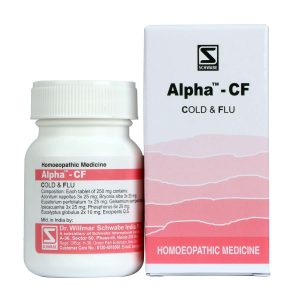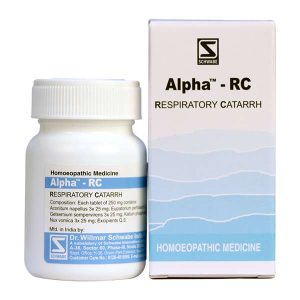
Coryza
-
-18%
 Rated 4.83 out of 5 based on 6 customer ratings(6)
Rated 4.83 out of 5 based on 6 customer ratings(6)₹198.00₹162.36 You Save: ₹35.64 (18%)Add to cart -
-18%
 Rated 5.00 out of 5 based on 1 customer rating(2)
Rated 5.00 out of 5 based on 1 customer rating(2)₹198.00₹162.36 You Save: ₹35.64 (18%)Add to cart -
-18%

Showing all 3 results
Coryza is an acute state of inflammation of mucous membranes of the upper respiratory tract. Though normally it is limited to nose and throat, the inflammation may progress to larynx and bronchi. It is commonly accompanied by cold or flu. Usually, coryza is harmlessly followed by irritation in nose, itchy sensation, burning in noses and eyes, tickling in throat. The inflammation causes an increase in the mucous build up from nasal cavities which leads to congestion and fullness of chest.
Coryza is a body’s reaction to allergens in the air (dust, etc.) or defense reaction of the immune system against bacteria or virus attacking the body.
Symptoms of coryza:
- Runny nose
- Sneezing
- Watery eyes
- Pain in throat
- Cough
- Wheezes
- A stuffy feeling in the nose
- Congestion of chest
- Headache
- Lethargy
- Mild body aches
- Mild fever
- Sleepiness
It could be watery in the beginning. Later, as the cold runs its course, the mucoid discharge becomes thicker in consistency and yellow/green in color. Children below the age of 4 are more susceptible to cold and coryza, although adults can also have a few episodes each year.
Causes
Rhinovirus is the most common perpetrator. The virus enters the body either by contact of anything infectious directly by touching, shaking hands, sharing contaminated objects like toys, towels or phone. The easy route for its spread is the oral route, nose or eyes. The virus can also enter the body through droplets in the air- when you are around someone sick, exposed to the coughs, sneezes or talks.
Risk factors
The following factors increase the chance of getting coryza:
- Age– Younger children below age 4 or adults in their late adulthood.
- Low susceptibility– A weak immune system or a chronic illness increases the risk.
- Falls and winter season– The drop in temperature during winters and fall makes you prevalent to catch a cold easily.
- Smoke– The chances of getting affected by the virus increase if you smoke.
- Allergies and asthma
- Exposure to sick people
Complications: The symptoms of coryza are hitherto not given much importance and clinically is grouped under minor sickness. But if the symptoms are ignored can advance to major complications like:
Acute ear infection (Acute otitis media).
- Bronchial asthma.
- Acute sinusitis.
- Streptococcal pharyngitis
- Pneumonia
Homeopathic Treatment
Consider homeopathic remedies as a safe, effective mode of treatment for coryza. Some of the remedies introduced by Schwabe are Alpha RC, Alpha CF and Biocombination No. 5 for management of coryza. These are some of the best decongestants and anti-inflammatory medicaments. The patients recover quickly and do not experience any of the sleep enduring, nauseating, dangerous side effects of orthodox cold remedies.
Blog Post


Effects of Diabetes, Smoking, and Other Factors on Sexual Health


Plant-based Protein vs. Animal Protein: Which is Better for Your Health?






























